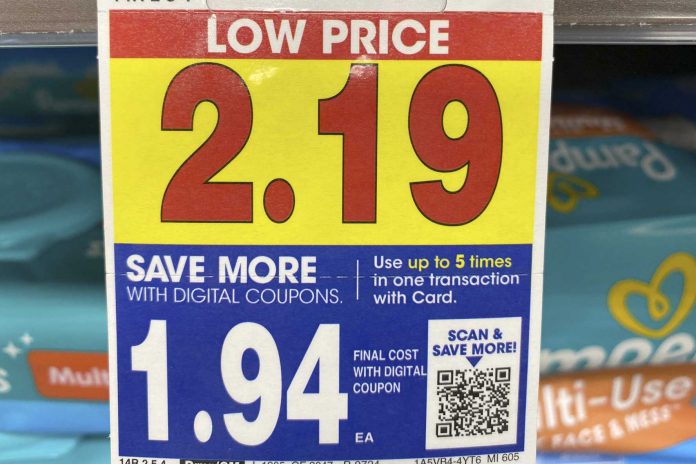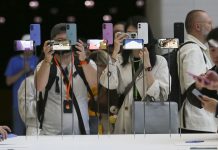
By DEE-ANN DURBIN
AP Business Writer
A coalition of consumer groups is asking grocery chains to rethink their digital-only coupons, saying the deals discriminate against people who don’t have smartphones or reliable internet access.
Digital-only deals __ advertised online or on store shelves __ can offer significant savings, but they generally require customers to electronically clip a coupon in a grocer’s app or on its website.
For example, a Kroger in Cincinnati, Ohio, is advertising frozen turkey for 60 cents per pound this week; with a digital coupon, the price drops to 49 cents per pound. And a Stop & Shop in Somerville, Massachusetts, is offering a half pork loin for $2.99 per pound; with a digital coupon, that drops to $1.79 per pound.
“There’s nothing wrong with digital coupons as long as they’re equitable and everyone can take advantage of the advertised price in one way or another,” said Edgar Dworsky, a consumer advocate and former assistant attorney general in Massachusetts who runs the website Consumer World.
Dworsky and others __ including Consumer Reports, Consumer Action, the Public Interest Research Group and the National Consumers League __ sent letters this week to Kroger, Albertsons, Stop & Shop and Smart & Final urging them to make sure deals are available in both digital and non-digital formats.
Kroger and Smart & Final didn’t respond to requests for comment from The Associated Press. Stop & Shop said it will review the letter.
Albertsons said it offers digital deals as a way to reward customers in its loyalty program, who can download the deals into their apps. But the company said many of its stores also let customers present the weekly circular to cashiers so the discounts can be applied at the register.
Dworsky said that can be problematic, since customers and cashiers don’t always know that’s an option.
Albertsons also pointed out that it owns Vons, a California-based chain that Dworsky praised for offering “clip or click” coupons in its circulars, which allow customers to cut out coupons or download them to their apps. Pennsylvania-based Giant Co. also offers “clip or click” coupons, Dworsky said.
“We will continue to provide assistance to users of the rewards program in the store to help them ensure they get the best possible experience and prices,” Albertsons said in a statement.
Dworsky said some stores offer refunds to customers who ask for the digital price, but that requires the customer to make an extra effort. He wants stores to ensure cashiers will honor digital deals upon request, or even go to the lengths of Texas-based H-E-B, which puts physical coupons in its stores next to advertised deals.
Dworsky said seniors are the most likely to lack smartphone or internet access or the technical savvy to figure out how digital-only coupons work.
Smartphone access varies widely by age group in the U.S., according to a 2021 study by the nonpartisan Pew Research Center. The study found that 96% of people ages 18 to 29 own a smartphone, compared to 61% of those 65 and older. The same study found that 25% of people 65 or older don’t use the internet.



















